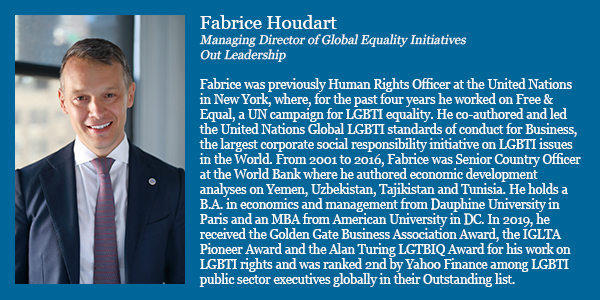
LGBTQ+ inclusion even in the countries which experienced progress on equal rights remains abysmal. It is even the case in the United States, arguably the country with some of the most pro-LGBTQ+ legal protections. In politics as an example, while the number of openly gay US congress members has increased – making it the “gayest congress that we know of” – to 7, only three lesbians serve in Congress (two in the House, 1 in the Senate). Altogether, these 11 LGBTQ+ individuals (4 of which are POC) represent 2% of Congress. In business, only 25 seats out of 5670 Fortune 500 Directors seats or 0.2% are occupied by openly LGBTQ+ people. A far cry from the share of the population which identifies as LGBTQ+
Underrepresentation and gaps in participation of minorities is not only unfair and a violation of human rights, it is a source of instability in our societies and an increasing threat to capitalism itself.
At the World Economic Forum’s 2016 Annual Meeting in Davos, Switzerland, there was a session on the role of the private sector in fostering greater inclusion for LGBTQ+ people, co-organised with corporate leaders on LGBTQ+ issues, such as Microsoft or Accenture, which was attended by my boss at the time, the United Nations High Commissioner for Human Rights. The session noted that many companies remained unaware that LGBTQ+ issues are a human rights issue. The meeting highlighted that the private sector globally has a limited understanding of this issue and often sees it as pertaining to the worlds of “corporate culture”, “tradition” or “private life”, rather than human rights.
Yet, during the same meeting, the High Commissioner pointed out that achieving further progress – especially in countries where neither the government nor public opinion is receptive to calls for change (a.k.a. the vast majority of countries outside of the Americas, Europe, Australia and some parts of Asia) – is going to take a collective effort from all parts of society and broader coalitions but particularly the private sector. “If we are to achieve faster global progress towards equality for lesbian, gay, bi, trans, and intersex people, businesses will not only have to meet their human rights responsibilities, but they must also become active agents of change,” is what he said.
This need for the private sector to scale up its game in fighting inequalities has only been bolstered by Covid19, the current economic crisis and the fragility of democracies all contributing to make a difficult situation on human rights harder. However, inclusion, as illustrated by the #BLM and #MeToo movements is more needed than ever.
The 2016 Davos meeting concluded that for the many companies globally that had not yet started their journey towards respecting the human rights of LGBTQ+ people, it remained unclear what aligning one’s policies and practices with human rights standards encompassed.
Finally, the impact of LGBTQ+ representation specifically is less studied because of lack of available data. Yet, one study found that companies that had LGBT-inclusive practices improved their own financial performance and outperformed their respective sectors within 5 to 10 years after adopting such workplace practices (Return on Equality, the Real ROE The Shareholder Case for LGBT Workplace Equality). That same study was reiterated a few months ago when Credit Suisse officially announced the results of what it calls the LGBT-350. There are companies either with openly lesbian, gay, bisexual or transgender senior managers and/or are voted LGBT+ inclusive employers in leading surveys.
In thinking about LGBTQ+ inclusion, participation and representation, companies are not only aligning their policies and practices with human rights, they are also contributing to solving societal issues and reinventing capitalism.
